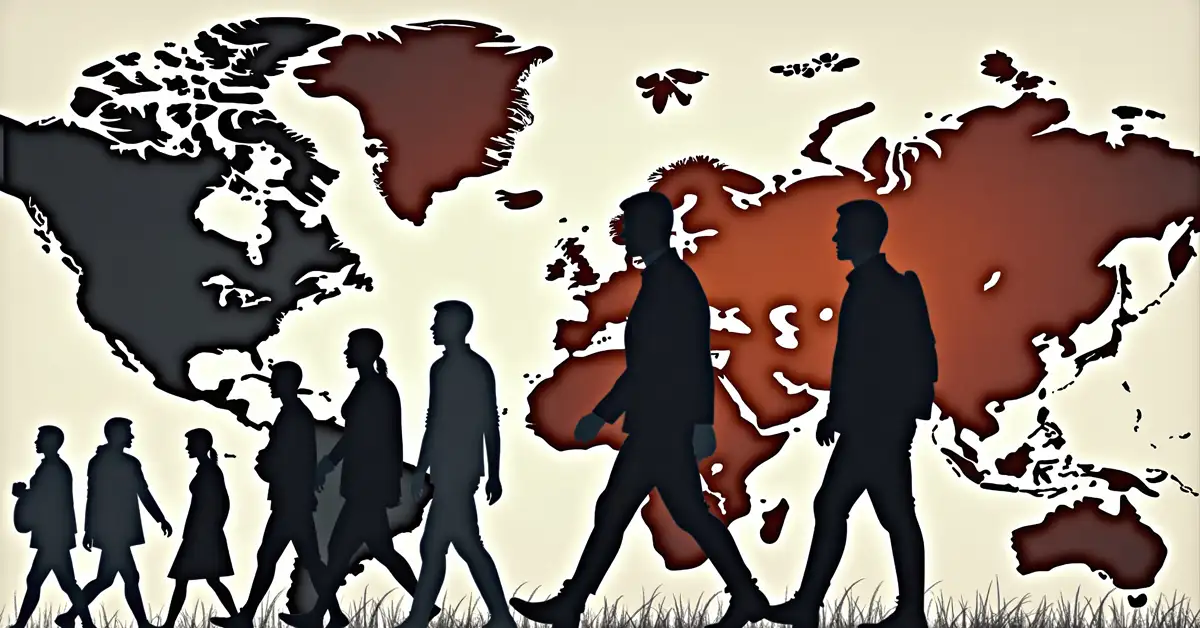Immigration matters including global mobility for business immigration have become a concern for many people now that the second Trump administration is in full swing. Visa holders are wondering what they can expect from the new administration and how they can prepare for changes that may affect them. News depictions of ICE raids and forced deportations have some people confused and worried. This article will give some information and provide tips regarding what you can do to protect yourself if the changes may affect you.
Everyone’s immigration story and circumstances are unique to them, so please know that the best way to protect yourself is to hire an immigration attorney who is experienced and knowledgeable about the complex laws and regulations which govern immigration matters.
Changes to Immigration Policies During the Second Trump Administration
As of this writing, there are still executive orders being worked on related to immigration. Most of them have to do with cracking down on undocumented immigrants who arrived unlawfully, meaning without undergoing an inspection at customs upon entry or having the appropriate paperwork.
New Executive Orders Signed that Affect Immigration
President Trump signed about 37 executive orders his first week in office for his second term. Many of those had to do with placing parameters on immigration, and some of the immigration changes specifically include the following:
- A new order directing DHS to use “enhanced vetting” for visa applicants and people already in the country in an effort to screen for potential terrorists or safety threats. This potentially could lead to processing delays or backlogs for all petitioners.
- Federally funded refugee resettlement programs may be paused or shut down as all funding to these programs has been stopped. The federal refugee program has historically aided refugees who enter the country lawfully. In recent years, up to 30,000 people a month have been allowed to enter the U.S. from Cuba, Haiti, Nicaragua and Venezuela for humanitarian reasons.
- President Trump signed an executive order attempting to end birthright citizenship for children born after February 19, 2025, whose parents arrived unlawfully. This order has already been challenged in court on the grounds that the Fourteenth Amendment to the U.S. Constitution grants citizenship to any child born in the United States. If the court had not granted an injunction while this lawsuit was pending, this order would have taken effect on February 19, 2025. Individuals who hold a nonimmigrant visa (F-1, L-1 or H-1B) would then have had to apply for a dependent visa for any new babies.
- Entry of all asylum seekers has been affected by the termination of the CBP One app, which was used to make appointments at the border ahead of time. Previously, asylum seekers arriving at the border could schedule appointments with border patrol agents and be granted a hearing. Now they have to wait in Mexico while their application for asylum is pending.
- Undocumented migrants have been asked to register their presence or risk being treated as a “civil and criminal enforcement priority” by ICE.
- TPS (Temporary Protected Status) provides work authorization and a stay of deportation to nationals of specifically designated countries. As of this writing, only Venezuelan nationals who are in the United States under Temporary Protected Status will not be eligible to renew their protection status when it expires in 60 days, and a previously applied extension until October 2026 was revoked.
Deportations
Deportations began immediately after the new administration took office, with anyone who has been in the United States unlawfully for less than two years being the primary targets for arrest and removal. This has drawn considerable media attention. Those who hold visas lawfully are not at risk for this, but many individuals are still worried about how new administrative changes will affect them.
How Will These Changes Affect You? What to Expect and How to Prepare
The way new regulations and restrictions on immigration into the United States will affect you depends on your circumstances, and is best figured out with the help of a seasoned immigration attorney who keeps up with changing requirements.
Global Mobility for Business Immigration
Global mobility specifically speaks to business migration, and the ability of companies to source talent across borders. U.S. companies may have to think differently about sponsoring employees from other countries given new guidelines already enacted or now in the works.
According to the National Law Review, “President Trump’s first round of [Executive Orders] would affect the processing of immigration petitions and applications before the US Citizenship and Immigration Services (USCIS), visa processing by the US Department of State (DOS), employers who rely on employee populations currently authorized to work under humanitarian programs such as Temporary Protected Status (TPS), and employers with employee populations comprised of undocumented individuals — regardless of whether or not employers are aware of their legal status.”
Regarding business immigration, the process will likely end up being slower. Due to new stricter criteria, there may be more Requests for Evidence issued during the application process, as well as Notices of Intent to Deny and denials of petitions or applications by USCIS.
There is speculation that there may be stricter vetting or even travel bans in the near future for migrants from countries whose citizens may be considered possible security risks. This also could result in much longer processing times, as well as limiting an employer’s ability to hire employees from these countries.
Visas
Some visas may not be affected to the extent others are. For example, the O-1 Extraordinary Ability or Achievement Visa could still be an option for employers. This is a short-term work visa for specialized fields. It is a non-immigrant visa for employees who are not seeking to migrate to the United States and is valid for three years initially.
H-1B visas may encounter more restrictions, although they are already very much in demand with a less than 25% approval rate. There are concerns that workers in the United States on these H-1B visas may encounter hold-ups if they travel internationally and attempt to re-enter the United States.
EB-5, or investment visas, still offer green cards for people who can make a large investment in certain areas within the United States which can create jobs. This may be an option for a much smaller group of people who want to move to the United States and can afford to start a business that creates employment for at least ten workers in the United States.
Holders of Non-Business Visas
For those already in possession of visas who are going through the process of acquiring green cards with the goal of citizenship in a lawful manner and no criminal background, the only anticipated hiccup at this time may be longer wait times and processing as the USCIS deals with increased requirements.
DACA recipients have not been targeted for removal, but anyone who has been charged with any level of criminal infraction may eventually find themselves on the list for removal.
What To Do If You Have More Questions
If you are unsure whether a family member or loved one has been detained by ICE, you can check using this link ICE search tool. If you have questions about the security of your own status or that of an employee, the best course of action would be to consult an immigration attorney. An attorney will be knowledgeable about the latest requirements and able to advise you of how to protect yourself from any enforcement actions or revoking of visa.
You can reach out to us to set up a consultation that will give you peace of mind or help you determine if you need an immediate action plan.





